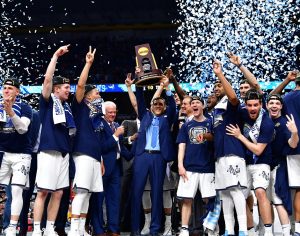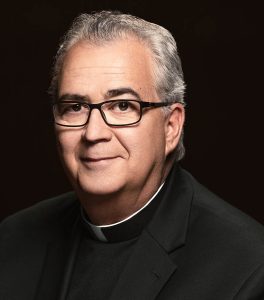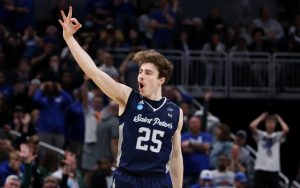Why Do Catholic Universities Have Successful Basketball Programs?
Catholic universities embraced basketball as far back as the tournament itself, which started in 1939. These programs have excelled in Catholic universities due to demographics. Dr. Rick Eckstein, a sociology professor at Villanova and expert in sports and society, stated, “[C]atholic schools originated in or near urban areas and were able to tap into immigrant communities – largely Catholic and Jewish – that could participate in basketball more than in other organized sports.” American Catholics were living in cities, such as New York, Philadelphia, Chicago, San Francisco, and New Orleans, where these schools are located. These Catholic schools served the Polish, Italian, and Irish immigrant communities. The Catholic Youth Organization (C.Y.O.) grew in these urban areas which attracted the poor to play basketball in church gyms. Black athletes, Catholic or not, eventually played basketball for their local chapter of the C.Y.O. which eventually led them to play basketball in these Catholic colleges.
Basketball programs also became a signature sport in Catholic colleges because of the low costs associated with this sport. Basketball requires low overhead, a small number of participants, and a gym. On the other hand, football programs demand a roster of about eighty people, substantial equipment, and a large field. Today, only Notre Dame and Boston College have football programs at the Football Bowl Subdivision level. Thus, most Catholic universities can channel more resources into their basketball programs.
History of Catholic College Basketball
The history of Catholic college basketball includes ten national championships. In 1947, Holy Cross, a Jesuit school in Worcester, Massachusetts, won the NCAA tournament by beating Oklahoma even though they did not have a gym on campus. La Salle, a small Catholic university in Philadelphia, followed by winning a national championship in 1954. Bill Russell led the University of San Francisco, another Jesuit school, to back-to-back national championships in 1955 and 1956. Bill Russell played for the Boston Celtics and was key to the Celtics’ eleven NBA championships during his thirteen-year career. In 1963, Loyola Chicago won the NCAA Championship and more importantly, were forerunners in the integration of college basketball by starting four black players. Another Jesuit school made its mark in college basketball history when Marquette won the national championship in 1977. Georgetown followed by winning the championship in 1984. The Most Outstanding Player Award in the 1984 NCAA Tournament went to basketball legend and Georgetown player at the time, Patrick Ewing. Patrick Ewing played for Georgetown for four years, in three of which the team reached the NCAA Championship game. Ewing had a seventeen-year NBA career, predominantly for the New York Knicks. He now serves as the head coach of Georgetown’s men’s basketball team since 2002. Villanova University, founded by the Augustinians, found success by winning national championships in 1985, 2016, and 2018. Villanova’s basketball program has been successful under Coach Jay Wright, head coach since 2001, as the Wildcats have made four Final Fours.

The Catholic Touch
If you have followed March Madness since 2018, you probably saw Sister Jean Dolores Schmidt, BVM, on camera every time Loyola Chicago played. Sister Jean has served as the Loyola men’s basketball team’s team chaplain for 29 years and it is safe to say she is a Chicago icon. The Ramblers’ success may in fact be due in part to Sister Jean’s pre-game prayers and signature pep talks. Sister Jean is known for giving scouting reports and sending players emails about their game performance. In 2021, The New York Times reported how players with merely average grades had to see Sister Jean weekly. Players have shared how Sister Jean has helped them – from learning how to write essays for exams to coaching on time management. Sister Jean also found time for each of the players and every player had a unique relationship with her. 102-year old Ramblers fan traveled to Pittsburgh when Ohio State Buckeyes beat the Ramblers by 3 points in the first round a few weeks ago.
Villanova also incorporates Catholic traditions into its basketball program. Each year, Villanova President Reverend Peter M. Donahue presides an opening mass for athletes and reminds the athletes that they are ambassadors for Villanova’s mission. Similar to Loyola Chicago, Villanova also has a team chaplain. Rev. Rob Hagan, O.S.A., serves as the Team Chaplain for Villanova’s men’s basketball and football programs. Coach Wright said of Fr. Rob, “He has been an integral part of the program and also of my life. I count on him as a dear friend. Our whole team and staff attend a prayer service before every game. It starts with Fr. Rob doing a reading from the Bible, and then he does a homily. He’s never talking about the game. He’s talking about life. And what kind of men we are and what kind of Christians we are. I always joke with Fr. Rob, ‘Don’t make us cry before the game.’”

Julie E. Byrne, a professor of religion at Hofstra University who specializes in Catholic studies, believes that embracing sports is a holy thing to do. She said, “It could have the potential to give glory to God.” Byrne referenced the Jesuit phrase “ad majorem Dei gloriam,” or “for the greater glory of God.”
As we’ve learned through our journey at Jesuit, the Jesuit philosophy extends to all aspects of life. The Jesuit philosophy teaches cura personalis, or “care for the person,” which extends beyond the spiritual and intellectual sense to a physical one. This philosophy is embedded in many of the Jesuit schools’ basketball programs found in Gonzaga, Xavier, Georgetown, and Creighton.
2022 March Madness
Eleven colleges are in this year’s NCAA Men’s Basketball Tournament. These schools include Gonzaga University, University of Notre Dame, Marquette University, St. Mary’s College, University of San Francisco, St. Peter’s University, Seton Hall University, Loyola University Chicago, Villanova University, Creighton University, and Providence College. Six of these schools are Jesuit schools.
The No. 15 seed in the East Regional, St. Peter’s, pulled a Catholic school miracle when the underdog beat the heavily favored University of Kentucky in the first round of the tournament. This marked the first time that the Peacocks won a game in this tournament. The Peacocks’ coach, Shaheen Holloway, is a former assistant coach and basketball player at Seton Hall, another Catholic university in South Orange, New Jersey. St. Peter’s went on to beat Murray State in the second round and Purdue in the Sweet 16.

The other surprise of the tournament was when the No. 1 team in the nation, the Gonzaga Bulldogs, was upset by the No. 4 Arkansas Razorbacks in the Sweet Sixteen. Although Gonzaga has been arguably the most successful team in the NCAA tournament in the past decade, they haven’t won a title.
The only Catholic school to reach the Final Four was Villanova. Unfortunately, the powerhouse basketball team of Kansas beat Villanova on April 2nd.
Overall, the Catholic schools represented well in the 2022 March Madness and we can expect Catholic schools to continue to perform well in March Madness for years to come.
